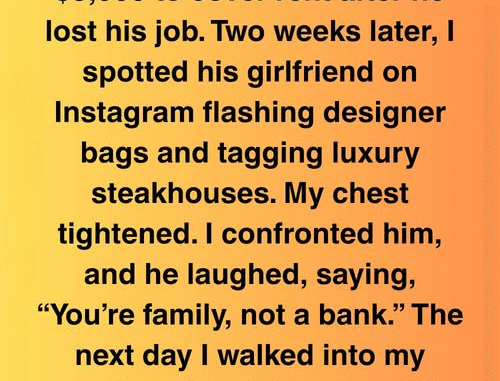
I thought I was helping my little brother get back on his feet.
Instead, he used my kindness to fund a date night — then stole from me to pay for it.
Darren lost his job, and when rent was due, he came to me for help.
“I just need $3,000,” he said. “I’ll pay you back as soon as I’m working again.”
I didn’t have it lying around, but I scraped it together. We’re family, right?
Two weeks later, I saw his girlfriend on Instagram — at a luxury steakhouse, flashing designer bags.
My stomach dropped.
I called him.
He laughed.
“You’re family, not a bank,” he said. “Relax.”
The next day, I walked into my apartment and froze.
My TV was gone.
My gaming console.
Two pairs of sneakers.
Even the jar of emergency cash — empty.
I live alone. No roommates. No key copies.
Except one — I’d given a spare to Darren.
I called him. No answer.
Texted: Did you take my stuff?
Silence.
That night, I barely slept.
The truth was sinking in: my own brother had robbed me.
The next morning, I drove to our mom’s house. Darren was crashing on her couch, lounging like nothing was wrong.
I didn’t sit. I didn’t wait.
“Where’s my stuff?”
He barely looked up.
“I pawned it. Was gonna tell you.”
“You pawned it?” I said, voice shaking. “That was over a thousand dollars’ worth of stuff! What about the $3,000 I gave you for rent?”
He shrugged.
“Rita had a birthday. I wanted to treat her.”
“With my money?”
“You make more than enough,” he said. “You live alone. No kids. No real expenses.”
I stared at him.
Our mom sat quietly, sipping tea — saying nothing.
“So you thought that made it okay to steal from me?” I asked.
“Don’t be dramatic,” he said. “I’ll get a job soon. I’ll get it back.”
“You’ve said that for six months.”
She finally spoke: “He just needs time.”
I stood up.
“You’re not helping him. You’re enabling him.”
And I walked out.
I didn’t want to. But I was done being the person he could always count on — even when he hurt me.
I filed a report.
Two days later, he called, furious.
“You got the cops involved? That’s low.”
“What’s low,” I said, “is stealing from your own brother and laughing about it.”
“You’re gonna ruin my record over a TV?”
“I didn’t ruin anything,” I said. “You did.”
He hung up.
I felt heavy — not guilty, but drained. Like I’d finally put down a weight I’d been carrying for years.
Friends told me to cut him off. Others said, “It’s family — forgive him.”
But forgiveness doesn’t mean letting someone keep hurting you.
Weeks passed. I recovered most of my stuff from the pawn shop — except the TV, already sold.
I bought a new one. Changed the locks. Blocked his number.
Then, in December, a woman named Marissa called me.
Turns out, Darren had been living with her cousin — another woman he’d been secretly dating behind his girlfriend’s back.
He’d lied about being a music producer. Promised to fund her clothing line. Even borrowed $600 from Marissa for a “studio mic.”
When she asked for it back, he vanished.
“He told us you were rich and didn’t care about money,” she said.
“That you said he could borrow anything he needed.”
I laughed bitterly.
“That sounds about right.”
A few days later, Mom called.
“Darren’s been arrested.”
He tried to scam a woman online — selling fake concert tickets. She reported him.
With my police report already on file, it was the final straw.
Part of me felt vindicated.
Mostly, I just felt tired.
Mom begged me to visit him.
“He needs support.”
“He needs a mirror,” I said. “Not more people cleaning up after him.”
In January, he was sentenced to probation and mandatory counseling.
Months later, I saw him at the grocery store.
He looked different — not just older, but humbled.
He stood by the dairy fridge and said, “I messed up. I know that now.”
I stayed quiet.
“I wasn’t raised like that,” he said. “You didn’t deserve any of it.”
That hit me.
Because no, I didn’t.
He handed me a folded paper — a handwritten repayment plan: $100 every two weeks.
I took it — not because I believed he’d stick to it, but because for the first time, he sounded real.
He’s kept his word.
He got a steady job. Moved in with coworkers. Paid me back every installment.
Rita left him — he admits it was fair.
Mom still hopes, but now she holds him accountable.
Last week, I invited him over for tacos and beer.
We talked. Not as victim and thief.
As brothers.
At the end of the night, he asked, “Do you still think I’m a screwup?”
“No,” I said. “But only because you finally stopped blaming everyone else.”
He smiled. “Took me long enough.”
It did.
But here’s what I learned:
Boundaries aren’t punishment. They’re protection.
Loving someone doesn’t mean letting them destroy your peace.
Sometimes, the most loving thing you can do is say:
“Enough.”
And sometimes — just sometimes — that’s the only way they’ll finally come back… better.